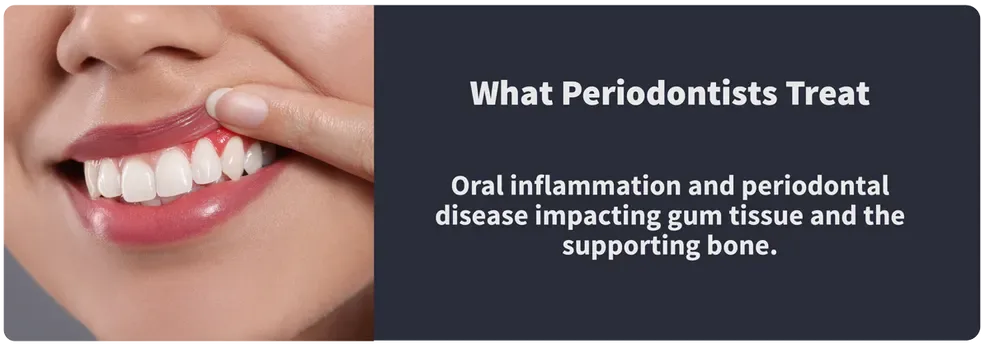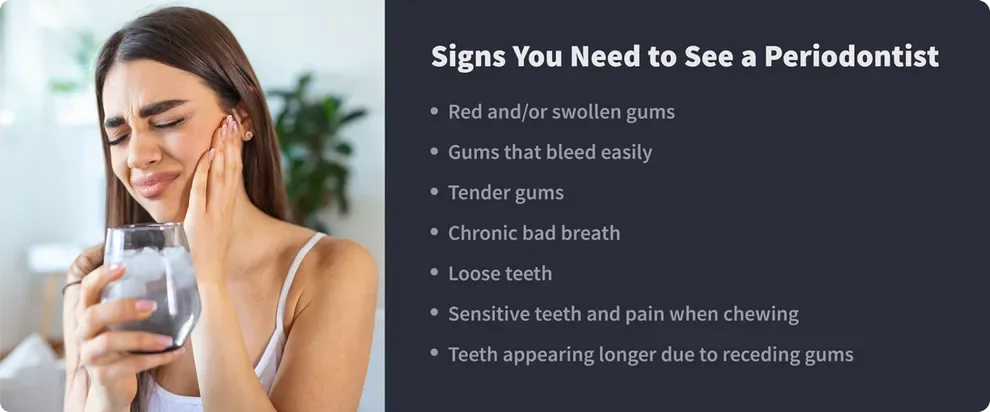Periodontists: What Do They Treat & When Would You Need One?

Table of Contents
- What Is a Periodontist?
- Education & Credentials
- What They Treat
- What to Expect
- When to See a Periodontist
- The Need for a Periodontist
A periodontist treats periodontal disease. They specialize in treating issues of the gum tissue and supporting bone. They are also specially trained in placing dental implants.
Nearly half of all adults in the United States, ages 30 and older, suffer from some form of periodontal disease, the Centers for Disease Control and Prevention (CDC) reports.
A periodontist is a dentist with an extra degree and additional credentials. Your dentist will often refer you to a periodontist if you are showing symptoms of gingivitis or progressing gum disease. You can also benefit from seeing a periodontist if you need a tooth extraction or bone graft after the removal of a tooth.
What Is a Periodontist?
A periodontist specializes in diagnosing, treating, and preventing periodontal disease and oral inflammation.1 Periodontal disease is an inflammatory disease that destroys gum tissue and surrounding bone.
A periodontist has extensive training and education in treating inflammatory conditions that impact the gums and bones that support your teeth. A periodontist is also trained to place dental implants and can often perform tooth extractions as well.
A periodontist has additional schooling and credentials above general dentistry. A dentist works to care for your teeth, while a periodontist helps you to care for your gums. Often, dentists and periodontists work closely together to form a complete continuum of care.
Education & Credentials for a Periodontist
A periodontist must first have a bachelor’s degree in biology, chemistry, or a related field and then a dental degree from an American Dental Association (ADA) accredited dental school where they receive either a DDS (Doctor of Dental Surgery) or a DMD (Doctor of Dental Medicine). Dental school takes an additional four years after the bachelor’s degree completion.
An aspiring periodontist must then complete a periodontic specialty program that is three years long to achieve the designation of a specialist periodontics. A periodontist will then need to pass an examination and become licensed.
Licensing requirements vary by state. Some require that a periodontist be licensed as both a dentist and a periodontist. In this case, they must pass an examination for each license.
What Periodontists Treat

Periodontists are experts in oral inflammation and periodontal disease impacting gum tissue and the supporting bone.2 They are able to diagnose, help prevent, and treat all stages of periodontal disease. Periodontists can also offer cosmetic periodontal procedures.
Periodontists can offer the following services and treatments:
Root planing and scaling: cleaning the infected surface of the root
Root surface debridement: removing damaged root tissue
Surgical procedures: often necessary for advanced and severe gum disease
Dental implants: placement, maintenance, and repair
A periodontist can also help with tooth extraction or removal, as any bone grafting that may be needed after the removal of a tooth. Periodontists have expert knowledge of supporting bone and gum tissue.
What to Expect at the Periodontist
At your first visit to a periodontist, they will survey your complete medical and dental history and perform an exam. It is important that your periodontist know about any medications you may be taking, as well as specific risk factors (such as smoking), as these can impact your gum and bone tissue, and play a role in treatment approaches.
The periodontist will examine your gums closely for gum recession and to see how your teeth fit together and if any are loose. They will often measure your periodontal pockets in between your teeth and gums, using a small probe to determine their depth. The periodontist may also take x-rays to determine your bone health underneath your gum line.
After the examination, the periodontist will discuss potential treatment options with you. The goal is to prevent further progression of periodontal disease, reduce inflammation and any current infection, and aid in maintaining good gum health moving forward.
When to See a Periodontist
Your general dentist will often be able to manage most things that have to do with your teeth, which can include your gum health. When gum disease becomes more advanced or severe, it is often best to consult with a periodontist.
The risk of periodontal disease increases with age. Periodontists are experts in managing periodontal disease, and it can be wise to start seeing one as soon as signs of inflammation and gum disease appear.
Periodontal disease can be connected to additional medical conditions, such as diabetes, rheumatoid arthritis, and heart disease. Treating inflammation of the gums may potentially lower the risk for these systemic conditions.3
The Need for a Periodontist

Periodontal disease is best treated in its early stages. It can be helpful to know the warning signs so you can get in to see a periodontist right away.
These are signs of periodontal disease:4
Red and/or swollen gums
Gums that bleed easily
Tender gums
Chronic bad breath
Loose teeth
Sensitive teeth and pain when chewing
Teeth appearing longer due to receding gums
As soon as any of these indicators are noticeable, talk to your dentist about finding a periodontist. A partnership between your dentist and periodontist can help to ensure that you have the highest level and quality of oral health care possible.
